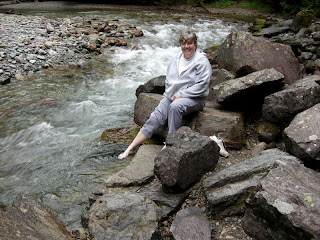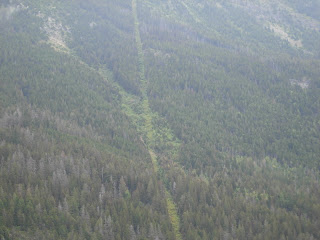One mountain here is called a triple divide peak -- which forms part of the Continental Divide. Water from this peak flows in three different directions -- Pacific Ocean, Hudson Bay to the Atlantic Ocean, and the Gulf of Mexico.
Out in St. Mary's Lake is a tiny island, called Wild Goose Island, the only island on the uninterrupted surface of this lake.
Jackson Glacier is one of the 25+ glaciers in the park, and one of the few you can view from the road. Most of the glaciers here have receded to the point that they are about to be reclassified as snow fields, a result of the global warming that has been going on for the last 10-12,000 years.
Waterfalls were abundant throughout this drive, from small trickles to gushers, some far away on distant mountains, and some right beside the road we were driving on.
It rained off and on the whole morning, and even sleeted on us for a while, and clouds came in and around the mountains continually. The temperature got down to 38 degrees at one point. As we headed up Logan Pass, we encountered heavy fog on our road.
The mountain views were continually changing, and one minute they would be clouded in, and the next minute the clouds would blow out and we could see. You can see in this next picture how this cloud was moving right in to the mountain wall (and our road).
When we topped Logan's Pass (elevation 6,646 - the pinnacle of this drive) we speeded up, deciding to stop on the way back at the viewpoints on this side. We drove alongside Lake McDonald as we neared the West Glacier entrance.
We exited the park and drove over to Whitefish to refill prescriptions and have lunch. We did see one deer on this part of the drive, but we had not seen any wildlife in the park. When we came back into the park, we stopped at Lake McDonald Lodge. All these lodges have lovely, warm fireplaces with roaring fires right now, which was very welcome.
Joe is waving from the back patio, which goes right down to Lake McDonald. The red buses were coming in here, and we met several of them on the drive, as well as several antique cars that were out for a drive. We left there and took a little side road (just to see where it went).
The forest is really thick here, and lush, with lots of undergrowth.
We stopped by the McDonald Falls and walked across the people/horse bridge (there was a sign that said horses have the right of way, and no person is allowed on the bridge if horses are crossing).
Our next stop was at the Trail of the Cedars, and we walked the 3/4 mile boardwalk among the cedars. Some of these trees are huge, and we took a picture of the red cedar.
One of the trees was uprooted and the dirt had fallen out from the roots, so we could really see how extensive a root system they have. But it is so wet here that the roots don't grow deep, so they are sometimes blown over by the strong winds. The second picture below shows the red showing through the bark of this red cedar tree.
We came upon one big tree that had been hollowed out. After checking it out for residents (varmints) inside, Joe climbed inside.
Just before we got back to the parking lot, we came upon Avalanche Creek, and I thought I should stick my toe in it, since it had been a while since I had done that. Unfortunately, my buddy Mazie was not with me to share this.
We tried to make all the stops we had passed by in the morning, and there were spectacular views all along. I would recommend this drive to anyone coming to this area.
This waterfall below is called Birdwoman Falls, and it's just beneath the Garden Wall.
We had to stop for road construction a few times, but the views were so beautiful that we didn't mind having a few extra minutes just to look. It didn't rain on our return trip, and most of the clouds had cleared so we got to see things that had been obscured on the morning drive. And just about 2 miles from camp, Joe spotted two huge bull elk that we got to watch for several minutes.
We weren't close enough for their racks to really show up, but they were probably the biggest racks we had ever seen. A small muley, buck, ran over toward the elk, then pulled up short. The elk were bugling, so we never did figure out what that deer was thinking, but it ran toward the elk, then on past. The wind was blowing about 50 mph by now, and it was really cold, but we stood outside the car and watched them for 15 minutes or so. We never saw any bear, or any other wildlife, but these 2 elk were beautiful. This turned out to be a 10-hour day for us, and we were beat when we got back to camp.









































































